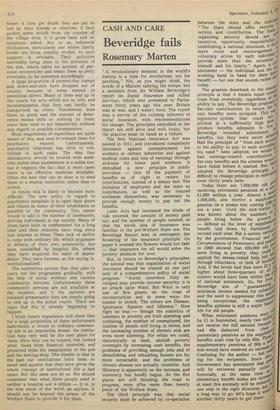CASH AND CARE
Beveridge fails
Rosemary Marten
"A revolutionary moment in the world's history is a time for revolutions, not for patching." Not, as you might think, the words of a Marxist rallying the troops, but a sentence from Sir William Beveridge's report on Social Insurance and Allied Services, which was presented to Parliament thirty years ago this year. Britain was at war, and I wasn't born. The report was a survey of the existing schemes of social insurance, with recommendations for change. The principles embodied in the report are still alive and well today, but the practice must be rated as a failure.
The first National Insurance Act was passed in 1911, and introduced compulsory insurance against unemployment for workers in certain industries and against medical costs and loss of earnings through sickness for lower paid workers. It embodied a new principle in public provision — that of the payment of benefits as of right in return for contributions, instead of a means test. The inclusion of employers and the state as contributors, as well as the insured workmen themselves, was necessary to provide enough money to pay out the benefits.
Later Acts had increased the kinds of risk covered, the amount of money paid out, and the number of people insured, so that the whole idea of insurance was familiar in the pre-Welfare State era. The Beveridge Report was, in retrospect, the flowering of the insurance principle. On paper it seemed the flowers would not fade — that insurance for all would solve the poverty problem for ever.
But, to return to Beveridge's principles: the second was that organisation of social insurance should be treated as one part only of a comprehensive policy of social progress. "Social insurance fully developed may provide income security; it is an attack upon Want. But Want is only one of five giants on the road of reconstruction and in some ways the easiest to attack. The others are Disease, Ignorance, Squalor and Idleness." How right he was — though the statistics of numbers in poverty are both alarming and confusing, the number of unemployed, the number of people still living in slums, and the increasing number of chronic sick are even more alarming. For while we could, theoretically at least, abolish poverty overnight by increasing cash benefits, the problems of providing enough jobs and of demolishing and rebuilding houses are far more intractable, and the problems of chronic disease are actually insoluble. And illiteracy is apparently on the increase, and numeracy has hardly begun. So the five giants are still blocking the road to progress, even after more than twenty years of the Welfare State.
The third principle was that social security must be achieved by co-operation
between the state and the individuto, " The State should offer securitY service and contribution. The State,; organising security should not incentive, opportunity, responsibility establishing a national minimum, it sil°(r; leave room and encouragement voluntary action by each individual fc,
provide more than the minimum himself and his family." Again, a
sentiment — the individual and the stflii working hand in hand for their te: benefit — but one that sounds rather 04 today.
11 a°
The greatest drawback to the ins-rv principle is that it entails equal coritritoi, tions from everybody, regardless of itr‘ ability to pay. The Beveridge proP059`50 flat-rate contributions in return fer rate benefits were accepted. This regressive system that could Otpi pitched at a sufficiently high le''' produce benefits adequate to liveo Beveridge intended subsistence vel, benefits, but they were never acilierdip Had the principle of "from each acco to his ability to pay, to each accordiafo: his need" been adopted, we would fc had earnings-related contributionsd flat-rate benefits and the scheme w°11,/,,,ii0 have failed before it started. But, '17t adopted the Beveridge principle, ...1e3 difficult to change principles in mid-s° even thirty years later. ecf Today there are 7,800,000 old rst receiving retirement pensions at a °co', £1,650 million a year. Almost a quantsr 1,900,000, also receive a supplernaen'o pension on a means test costing £2'10 ion a year. Until the midisixties was known about the numbers 0f lid people living below the povertY — defined as the level of suppleM,e benefit laid down by Parlianlea revised each year. But a survey carArleothi by the government, Financial a",,ii511 Circumstances of Pensioners, and Ptiv„el in 1966 showed that 850,000 oldjor were living in poverty: they coutuildr, applied for means-tested help but Pied through reluctance, or lack of ken, And, if the levels had then been higher, about three-quarters of 3'00! sioners would have been within theft of national assistance. So, far Beveridge aim of " guaranteelepe minimum income needed for subffii and the need to supplement this being exceptional, the supPlelpttirel benefits systems is still a major fea life for old people. rai? When retirement pensions were.00tt by £1 in September, nearly two not receive the full amount becaUs had 40p deducted from their eri!, plementary pensions as the suPPlefilse benefits scale rose by only 60p. Th°,ee. supplementary pensions of 60p a"0 less would have received no increas", Confusing for the author — but ,filer ing for the recipients. Since t'eror, Government has announced that P r !tr will be reviewed annually rattles biennially, at the same time Bosd; plementary benefit scales are incre,,ed.1,' at least this anomaly will be rernovt the' one step in the right direction, 131100' a long way to go: let's hope it vv° another thirty years to get there.










































 Previous page
Previous page